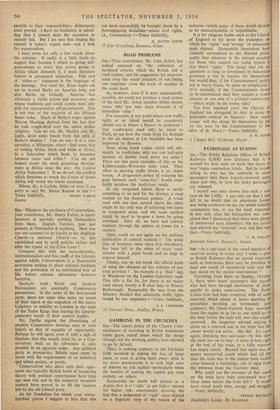GAMBLING IN THE CHURCHES SIR, —The recent policy of the Church
Com- missioners of investing in British Industrials raises grave moral issues which the clergy (though not the working public) have allowed to go by default.
There is nothing contrary to the Christian faith involved in risking the loss of large sums, or even in giving them away; what is far more questionable is to seek high rates of interest on risk capital—particularly when the burden of making the capital pay rests entirely on others.
Economists no doubt will declare as a dogma that it is 'right' to get highzr returns for higher risk; conveniently ignoring the fact that a judgement of ' right ' must depend on a dogmatic vie/ of the nature of the
universe—which many of them would declare to be unascertainable or unjustifiable.
It is for religious bodies such as the Church of England to lay down the principles on which the ' rights ' and 'wrongs' of economics must depend. Economists themselves have virtually surrendered to the Marxist philo. sophy that whatever is the current practice for those who control our social system Is (for them) 'right.' The clergy also ask no questions as long as investment in industrials produces a rise in income for themselves; but would they, if the Commissioners' policy led to heavy losses, be quite so complacent ? (For example, if the Commissioners invest in de-nationalised steel they acquire a vested interest on one side of a political controversy —which might be the losing side.)
For four hundred years the Church Of England has abrogated its duty to make its principles control its finances. How much longer will the clergy let themselves be led by the nose by the Commissioners to the altar of St. Marx 7—Yours faithfully,


































































 Previous page
Previous page